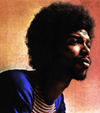 It is with incredible sadness that Brainwashed acknowledges the passing of Gil Scott-Heron, aged 62; poet, author, activist and musician; one of the most original, enduring voices in soul, blues, jazz and spoken-word music I have been blessed to hear.
It is with incredible sadness that Brainwashed acknowledges the passing of Gil Scott-Heron, aged 62; poet, author, activist and musician; one of the most original, enduring voices in soul, blues, jazz and spoken-word music I have been blessed to hear.
Scott-Heron stepped into music in 1970 with his debut album, Small Talk at 125th and Lenox, a first shot at addressing a variety of difficult topics—superficial consumerist culture, political hypocrisy, middle-class ignorance of the black man's struggle. His next two albums on Flying Dutchman Records, and his first two with keyboardist and long-time collaborator Brian Jackson, are among the most essential of Scott-Heron's recorded work: Pieces of a Man and Free Will, released in 1971 and 1972, respectively. There are far too many incredible tracks to cite from these records: his most recognized piece, "The Revolution Will Not Be Televised," is an effective representation of his spoken-word style, but merely the tip of the iceberg as far as his breadth of talent.
Scott-Heron struggled openly with drug addiction in recent years. In a sense, perhaps we were fortunate to have him with us for 62 long ones. His most recent work, last year's tremendous, gripping I'm New Here, was his first album in 16 years. It introduced a new generation of listeners to his voice, by then weathered and broken; with further investigation, it was an ideal gateway to explore his life's work and influence. If you haven't heard his swan song, lead tracks "Me and the Devil" (originally by blues legend Robert Johnson) and "New York Is Killing Me" are as good a place as any to start—if not "I'll Take Care of You," the album's assured, emotional centerpiece.
Scott-Heron was a brilliant musician and lyricist. Beyond his latest work, I would encourage listeners to start by seeking out the mournful rumination of "The Get Out of the Ghetto Blues," the self-examining balladry of "Pieces of a Man," the funk blueprint of "Home Is Where the Hatred Is," and the smart social commentary of "Whitey on the Moon." The joyous "I Think I'll Call It Morning" is especially resonant in the wake of his passing—a more fitting obituary than any I could write him:
Why should I survive on sadness
And tell myself I've got to be alone?
Why should I subscribe to this world's madness
Knowing that I've got to live on?
Yeah, I think I'll call it morning
From now on
I'm gonna take myself a piece of sunshine
And paint it all over my sky
Be no rain...
Let us always remember Gil Scott-Heron's legacy and influence: through his incalculable influence on hip-hop, soul, blues and spoken-word musicians of today, of course, but more importantly through Scott-Heron's own recordings, his timeless music and the valuable messages behind it.



